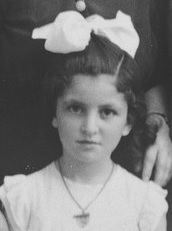
-
Learn More about Ninetta
- Oral History Listen to Ninetta's Oral Testimony
Ninetta Matsa Feldman was born in 1938 in Arta, Greece, to Esther and Leon Matsas. In 1940, the year Italy invaded Greece, Ninetta, her older brother, Michael, and their parents moved to Agrinio, where Leon worked for the National Bank of Greece.
During the Greco-Italian war, Leon was drafted into the Greek army and reported to Ioannina. Ninetta, Esther, and Michael relocated with him to be near extended family. Ninetta and her family often sought shelter in the ancient city walls during air raids. In April 1941, Nazi Germany joined Italy in the war against Greece. After Greece's surrender, the Axis powers divided the country into occupation zones; Ioannina and Agrinio fell under Italian occupation. Ninetta, Michael, and their parents returned to Agrinio. In 1942 Ninetta and her mother visited Ioannina and Albania, and they enjoyed traditional meals prepared by Ninetta’s grandmother and spent time with her cousins. This would be the last time Ninetta saw her extended family.
Following Italian capitulation to the Allies in September 1943, the Germans took over the Italian occupation zones, and life became dangerous for the Matsas family. Soon, Leon and Esther learned that Jews in Athens had gone into hiding. With the help of friends and Greek partisans, Ninetta’s family relocated to Psilovrachos, a village under partisan control, in the mountains of Aitoloakarnania.
The family rented a room without electricity, running water, or furniture, and Ninetta attended the village school. Although classmates asked why she did not participate in morning prayer or make the sign of the cross, Ninetta found acceptance with her classmates. The president of Psilovrachos procured German identity cards for the residents of the village, including Ninetta’s parents who took on Greek-Christian names. In November, as German patrols approached, Ninetta and her family fled high into the mountains.They found shelter with a villager and spent eight days hiding in the villager’s home at night and in a cave and in the forest during the day. The family returned to find their landlord had stolen all of their food. Facing winter on the brink of starvation, the family moved to another house in Psilovrachos.
In the summer of 1944, as German troops approached Psilovrachos once more, Ninetta and her family fled to Kamaria, located at the top of the mountain, and Ninetta watched the burning of houses below. Due to lice infestation, Ninetta’s thick, curly hair had to be cut off. In fall, the Germans retreated from Greece, and the Matsas family returned home in October. Approximately 126 members of Ninetta’s family were killed in Auschwitz.
Ninetta immigrated to the United States in 1959, three years after her brother. Her parents followed a few years later. She settled in the Washington, DC area where she met and married Lloyd Feldman. Together, they have one daughter. Ninetta taught at schools in Washington and Maryland. Today, Ninetta is a volunteer at the United States Holocaust Memorial Museum.
